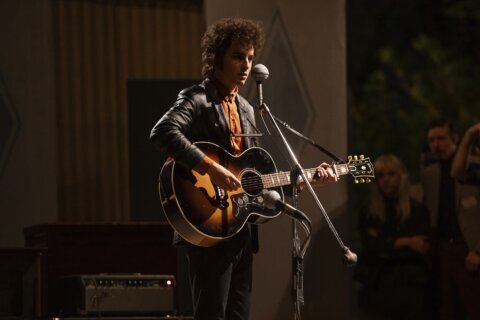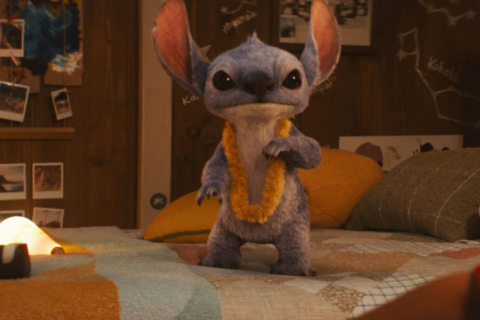The one-time lost Christmas classic “It’s A Wonderful Life” staged an unlikely comeback in the 1970s and 1980s by becoming a December TV staple, after underperforming at the box office and failing to win big at the Oscars when it debuted in the ’40s.
Ubiquitous every December on the small screen, it has also become a staple in the last two decades at a select group of independent art theaters across the US aiming to give film buffs the ultimate Christmas experience: watching George Bailey’s “crucial night” unfold in a theater not unlike the one seen in the movie.
And there’s never been a better time to see it on the big screen. That’s because while the film had a limited theatrical release at the end of 1946, the 75th anniversary of its wider release in 1947 is being celebrated with event screenings in more than 1,000 theaters across the US this December, as part of a collaboration from Turner Classic Movies, Paramount Pictures and Fathom Events.
Screenings of the feel-good film directed by Frank Capra begin at those theaters on Dec. 18.
But showings have already begun elsewhere in other locations like IFC Center in Manhattan, one of the stalwart independent movie theaters to faithfully feature annual showings of the film, which starred James Stewart, Donna Reed and Lionel Barrymore.
The film is a holiday tradition for many
Annual theater screenings of “It’s a Wonderful Life” have taken their place along with holiday shopping and cookie swaps as must-do traditions, and they speak to the enduring appeal of the film, which chronicles the story of a small-town savings and loan manager — George Bailey (Stewart) — who decides one fateful Christmas Eve that life is not worth living.
“There are people who have made it a key part of their holiday traditions,” said Toby Leonard, director of programming, at the Belcourt Theatre in Nashville, which has been showing the film every holiday season since 2001.
At Cinestudio, Trinity College’s jewel box of a theater in Hartford, Connecticut, patrons like to put the annual showings on their calendars in advance.
“It’s definitely a holiday tradition for patrons to come to Cinestudio to see the film, and I get calls in early September from people asking, ‘What are your dates for ‘It’s a Wonderful Life?'” Lew Michaels, the executive director told CNN, while sitting in the theater, a converted chemistry lecture hall.
Jessica Montano, an HR manager who lives in Manchester, Connecticut, is one of those patrons. She attends a screening every year with her husband, and this year plans to bring friends, too. Montano, 48, said she began watching the film as a young girl on TV like most American fans. But she’s been attending screenings at Cinestudio for the past five years and she said it makes a big difference.
“You feel like you’re going back in time at the theater,” she told CNN. “I can enjoy how beautiful the theater is, and I sit down, get away from everything and take a moment out of the crazy Christmas season to just enjoy it.”
Jennifer Eberle has been a fan for as long as she can remember and now watches the film at the Belcourt every year with a group of friends. They attend a late afternoon showing so they can have dinner after the movie, shown in the original black and white, which Eberle, 46, says enhances the experience.
“It is a story of loss and failure followed by joy and redemption,” the Nashville trial attorney told CNN, explaining its appeal.
The movie, which debuted shortly before Christmas in 1946 in order to qualify for the 1947 Academy Awards, has long had a cult following.
There’s a ‘collective’ feeling of seeing it in the theater
There are at least two “It’s A Wonderful Life” festivals — one held in Seneca Falls, New York, site of a museum dedicated to the film, and another in Indiana, Pennsylvania, the hometown of Stewart, the actor who played George Bailey.
The festival in Seneca Falls, which takes place this weekend and whose founders consider this year the film’s 76th anniversary, brings together the actors who played the Bailey children and members of Capra’s family.
Anwei Law, one of the museum’s founders, told CNN that Capra always stressed “the value of each individual person,” which she said renders the film’s message endlessly relevant.
It’s that timeless appeal that Fathom Events hopes to tap with the two days of event screenings.
The company, which is owned by theater chains Cinemark, AMC and Regal Cinemas, distributes content to theaters and organizes limited-engagement event screenings of older films.
Advanced ticket sales and the number of participating theaters, including 300 theaters not owned by those three chains, indicate strong interest for the “It’s A Wonderful Life” event screenings, spokesperson Colette Carey told CNN. She said ticket sales for the Capra classic are outpacing the company’s next bestselling holiday event screening by 60%.
Fathom has long wanted to revive showings of “It’s A Wonderful Life,” Carey said, noting that fans have been asking for it. The company is already hoping to repeat the promotion next year.
Such screenings lure patrons back to the theaters, which are seeing fewer films with theatrical releases in the post-pandemic era and quicker pivots to streaming for movies that do make it into the theater, said Daniel Loria, editorial director of Box Office Pro, the official publication of the National Association of Theatre Owners.
It’s hardly surprising fans want to see the movie — which exalts the power of community — on the big screen.
“There is a collective feeling that you don’t get on your couch at home,” said Michaels of Hartford’s Cinestudio.
The large rollout this month will likely find one of the most loyal fan bases out there. Leonard, at Nashville’s Belcourt, said one year the theater had commitments to show other films on Christmas Eve so there was one fewer screening of “It’s A Wonderful Life” that day. Fans were not shy about expressing their disappointment, and the theater learned its lesson. This year, there are four showings on Christmas Eve at the Belcourt and two on Christmas Day.
“We don’t want to ruin anyone’s Christmas,” Leonard said, only half-jokingly.
No film is a failure if it has fans
What’s long delighted film historians is the fact that when “It’s a Wonderful Life” debuted, it was largely deemed a wash. The film, whose signature advice is the line, “No man is a failure who has friends,” was initially more or less a failure.
While it received good reviews, it wasn’t a box office juggernaut, and it failed to win major awards. The rights for the film changed hands several times and weren’t renewed in the 1970s, which allowed the movie to fall into public domain.
That’s characteristic of the entire history of the movie. As film historian Jeanine Basinger writes in her compendium, “The It’s A Wonderful Life Book,” the original idea for the film languished for years before the studio RKO sold it to Capra in 1945 for a mere $10,000.
In a chapter called “The Many Lives of It’s A Wonderful Life,” Basinger, professor emerita at Wesleyan University, notes that “no one seemed able to turn the oddball story into a treatment that could work well on screen.”
There was something special, however, about that “oddball story” because many original details and lines survived the leap to the big screen.
The original story was called “The Greatest Gift,” by Philip Van Doren Stern, and according to the text republished in Basinger’s book, it is there that George first utters the immortal line, “I said I wish I’d never been born.”
It’s hard to imagine now that it didn’t emerge triumphant at the Oscars in 1947, where “The Best Years of Our Lives,” took home the top prizes.
Capra had high hopes for the film. As Basinger notes, when the film lost out on the three Oscars Capra and Stewart coveted the most — best picture, best director and best actor — it was a blow.
“(Capra’s) archives reveal how he must have felt,” Basinger wrote of the collection of film material from the director’s career, now housed at Wesleyan. “There is no coverage of Oscar night — not a single clipping, not a single photograph or souvenir.”
And scrapbooks he had been keeping about the film, “abruptly stop.”
‘We’re all George Baileys’
While often seen as schmaltzy, sentimental fare, there is a distinctly dark side to the film. Bailey, after all, goes to a bridge in his fictional small town, Bedford Falls, to end his life in one of the film’s more tragic scenes.
“When you get down to it, it’s really about the ongoing struggle,” Leonard at the Belcourt in Nashville told CNN.
For many fans, the film’s darker side deepens its appeal.
Montano, for example, likes Lionel Barrymore’s character, Henry F. Potter, “the richest man in town,” as he’s described in the film, and the person who pockets $8,000 of Bailey’s company’s money, sending the main character into a suicidal tailspin.
“I know he is a meanie but he adds depth to the movie,” she said.
Eberle, in Nashville, agrees. “It is not necessarily a happy film,” she said, adding that the movie is captivating for the range of emotions it inspires in viewers.
The actions of the Potter character also add a layer of realism. Some fans wished for a different ending so that the film’s villain would be punished. But in real life, sometimes the bad guys get away with it.
In a 1956 letter to a fan who said the film struck his heart, Capra said the movie “has probably touched … more people than any of the others I’ve made.”
“You see,” he wrote in the letter, which is reprinted in Basinger’s book, “we’re all George Baileys in one form or another.”







